|
|
Colombia's Emeralds Gemstones | planetarygems.com
Page
1
2
3
Next >>
The Republic of Colombia is
situated in Northern South America, bordering the Caribbean
Sea to the north, between Panama and
Venezuela, and bordering the Pacific Ocean to the
west, between Ecuador and Panama. It
borders also with Brazil to the south-east, and Ecuador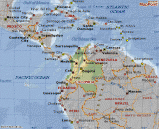 and Peru' to the south. Its area total for 1,138,910 sq km
and it is approx double the size of Texas. Its
climate is tropical along coasts
and eastern plains and cooler in highlands.
Santa Fe de Bogota' is its capital, situated in the central part of
the country in the oriental highlands, with a population of approx
7.2millions (2018). The country total population of 45 millions is divided as
mestizo (mix between European and
Amerindian) 58%, white 20%, mulatto 14%, black 4%, mixed
black-Amerindian 3%, Amerindian 1% . The Spanish
spoken in Colombia is considered the most refined, articulate and
true to its original in the world. Colombia is rich in natural resources such as petroleum, natural gas,
coal, iron ore, nickel, gold, copper, emeralds, hydropower.
and Peru' to the south. Its area total for 1,138,910 sq km
and it is approx double the size of Texas. Its
climate is tropical along coasts
and eastern plains and cooler in highlands.
Santa Fe de Bogota' is its capital, situated in the central part of
the country in the oriental highlands, with a population of approx
7.2millions (2018). The country total population of 45 millions is divided as
mestizo (mix between European and
Amerindian) 58%, white 20%, mulatto 14%, black 4%, mixed
black-Amerindian 3%, Amerindian 1% . The Spanish
spoken in Colombia is considered the most refined, articulate and
true to its original in the world. Colombia is rich in natural resources such as petroleum, natural gas,
coal, iron ore, nickel, gold, copper, emeralds, hydropower.
The Emerald
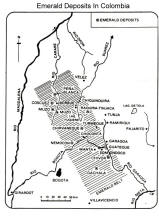 remains one of the most popular gems today
and is one of the rarest and most valuable precious stones. And Colombia holds the tradition of
producing the world's finest. In the 1500, as the Spaniards arrived in
the New World, realized that they had a valuable gem resource to exploit.
The Muisca and Chibcha
Indians, the Colombian natives of the northern regions
of Bogota', fought fiercely the Spanish Conquistadores to protect their
heritage and the location of the emerald mines as well. Nonetheless, the
Spaniards took control and began to bring the green gems back remains one of the most popular gems today
and is one of the rarest and most valuable precious stones. And Colombia holds the tradition of
producing the world's finest. In the 1500, as the Spaniards arrived in
the New World, realized that they had a valuable gem resource to exploit.
The Muisca and Chibcha
Indians, the Colombian natives of the northern regions
of Bogota', fought fiercely the Spanish Conquistadores to protect their
heritage and the location of the emerald mines as well. Nonetheless, the
Spaniards took control and began to bring the green gems back
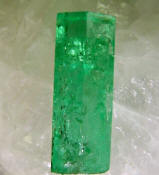 to Europe.
The rest is history. to Europe.
The rest is history.
Colombia supply 60% of the world's emerald
output and 80% of the highest quality emerald available in today's
market. In Colombia, north to the border with Ecuador, the Andes
split in three parallel ranges, western, central and eastern
("cordillera occidental, central y oriental").
The
main Colombian mines are located in the "Cordillera
Oriental" region of the Colombian Andes mountains,
also referred
to as "The Emerald Belt". The Chivor mine in the eastern region
is the only major privately owned emerald mine in Colombia. The
Muzo mine in the western region is leased to the government for
10 year periods to the Sociedad de Mineros Boyancences.
Muzo is located about 120
kms. north of Bogota', at an altitude of 2,200 feet (750 meters)
above sea level. The region is hot and
humid, and surrounded by thick tropical vegetation. The mine
embraces the Itoco river, an affluent to the Minero river. There are
several mines in the area and the most important are Coscuez, Pena
Blanca, Taquendama, El Cholo. Emeralds are found deep down the earth
in black calcium-rich shale, often fractured and containing emerald
agglomerates with calcite, barite and pyrite. The mining area and the official "cortes" or mine shafts are
all controlled and gunned guarded, but there are hundred shafts
unknown and undocumented.
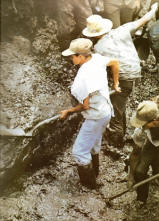
Excavators, hydraulic jacks and dynamite are
also used on the open air to cut huge swaths into a mountainside.
Large quantity of water is then released from a reservoir above, to
wash the area just worked free of debris. This allows to loosen up
the emerald bearing material (carbonaceous limestone, shale, salt)
and expose the calcite veins. At this point, all the mechanized
equipment is stopped, and miners armed with picks and shovels, work
this material in search for emerald crystals. It is estimated that
during this process a mine gets approx 35% of the emerald
production, with the rest being destroyed during the process or
streamed down the mountain below. However, there are also the miners
in shafts and tunnels below the ground, that recuperate emeralds for
the mine leasing company. The rest is smuggled out (40% according to
officials) and
another 10% divided in between the crew, as part of the contract
with the mine officials.
When the emerald bearing has been searched thoroughly by the mine,
the discarded tailing is then bulldozed or streamed down to the
Itoco river below, where hundreds of "Guaqueros"
(literally "treasures hunters)
pan and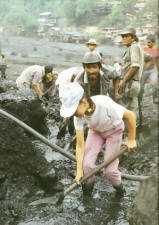 prospect these murky water for emerald of any grade, usually of very
low quality. It is the quest of being at the right moment at the
right time, the lure of instant wealth, or perhaps the mystical
calling of the black earth below, all of these and many other
reasons that motivate men, women, children, elderly to dwell and
work in unstable, unhealthy and dangerous conditions for many
weeks at the time.
prospect these murky water for emerald of any grade, usually of very
low quality. It is the quest of being at the right moment at the
right time, the lure of instant wealth, or perhaps the mystical
calling of the black earth below, all of these and many other
reasons that motivate men, women, children, elderly to dwell and
work in unstable, unhealthy and dangerous conditions for many
weeks at the time.
In the immediate pueblos (small towns)
surrounding the mining areas, emerald roughs markets is held every
week end. It is the occasion to move the findings of the previous
weeks and get the hard cash. Rough emeralds ("Esmeralda en bruto")
are changing hands, bought and sold quickly. The official output of
the mine is instead flown by helicopter. No matter who buys the
rough, no matter the transportation mean, every single piece find
its way to Bogota', the capital, where it will be cut, oiled and
sold again.
Page
1
2
3
Next >>
|